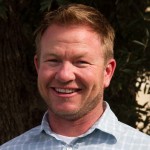New executive director for Upper Salinas – Las Tablas Resource Conservation District

Devin Best
-Special from the Soaring Eagle Press-
The Upper Salinas – Las Tablas Resource Conservation District (US-LT RCD) announced this week that Devin Best has been promoted to executive director effective June 2, 2014. Laura Edwards, the previous Executive Director, will now work part-time as the US-LT RCD Program Manager to give her more time with her young family.
“Please join me in welcoming Devin to his new role,” said Edwards. “I am confident in Devin’s leadership skills and look forward to helping him put his creativity to the streets, streams and farms of Northern SLO County, and continue to expand the reach of the RCD.”
Bio of Devin Best from US-LT RCD
Edwards has a varied experience in natural resource management from biological population monitoring and modeling to resource assessment and restoration. He has worked in watersheds from southern California to Oregon and Washington. Additionally, Devin has been employed by the National Marine Fisheries Service (NMFS) as a Natural Resource Management Specialist. Part of his role while working for NMFS was to ensure compliance with the Endangered Species Act and permitting of authorized projects.
Prior to his employment with NMFS, Best was Restoration Project Manager for the Crooked River Watershed Council in Oregon, developing restoration projects for 2.8 million acres of Crook, Wheeler, Grant, Deschutes, Harney, Lake and Jefferson Counties. He was also formerly employed by the Confederated Tribes of Warm Springs, Oregon to conduct fisheries research of steelhead populations in the Lower Deschutes River. Growing up on a California farm, Best’s earliest earthly experiences are rooted in agriculture. His goals include collaborative work at the watershed scale to see recovery of anadromous species, improved water quality, and foster conservation stewardship and community resiliency.




















